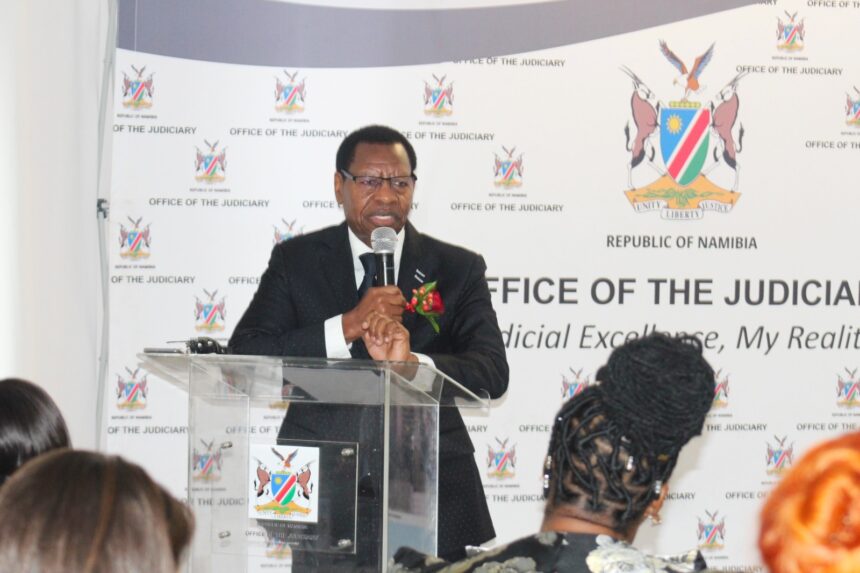SWAKOPMUND – Chief Justice (CJ) Peter Shivute says the Judiciary faces a challenge in finding replacements for High Court and Supreme Court judges close to retirement.
“We are currently working on a succession plan, but we need your assistance in this regard,” he told magistrates who attended a two-day magistrates’ conference in Swakopmund.
The conference serves as a critical platform for magistrates from across the country to exchange ideas, and reflect on the crucial role the magistracy plays in the administration of justice.
Shivute said the Judicial Service Commission (JSC) has sent out notices to designated organisations, announcing vacancies in the High Court.
“The Magistrates Commission is one of these designated organisations, and I encourage you to make yourselves available for this career path,” the CJ told over 90 magistrates from all over the country on Tuesday.
He also appealed to the Magistrates Commission to do due diligence on potential candidates so that they sent the best possible candidates to the JSC.
“This will make our task at the JSC easier. I also urge the Law Society to encourage its members to make themselves available to serve the nation. It is not about remuneration, sacrifices are also needed. Everyone should make sacrifices and offer themselves to serve,” he appealed. Shivute added that he would even go beyond the traditional sources of judicial recruitment, as the time has come to extend the wings beyond the magistracy and the legal profession.
“Members of academia, identify yourselves, and make yourselves available to serve. We are going to expand our recruitment sources because the challenges the High Court and Supreme Court will face in the coming years are enormous. We call upon you to assist us in this succession plan,” he urged.
The chief justice highlighted the significant role played by lower courts, which are often the public’s first point of contact with the justice system.
“This first impression must reflect fairness, professionalism and efficiency, as it shapes the public’s perception of the Judiciary,” he said.
Consistency must thus reign in court administration across the country. All magistrates must apply the rules of procedure consistently, as uniformity across all aspects of court administration is essential for public trust.
“A unified magistracy is vital to maintaining public confidence in the judicial system. When the public sees that our courts operate consistently, they gain confidence that the rule of law is being applied fairly across the nation,” Shivute stressed.
He also acknowledged the increasing pressure on the courts due to the expanding jurisdiction of magistrates’ courts, which will increase the pressure on magistrates.
“With the new divorce legislation on the horizon, the burden on magistrates will increase. I call upon policymakers and those controlling budgets to ensure that the Judiciary is adequately resourced to meet these new demands,” he continued.
This year’s conference under the theme ‘Fostering a Unified Magistracy, offers a timely focus on how magistrates, as custodians of justice in the lower courts, can continue to ensure the efficient, consistent and fair dispensation of justice throughout the country.
Shivute again urged magistrates to find ways to better manage their growing caseloads to ensure justice remains timely, accessible and fair.
Reforms
The Judiciary’s executive director Bernard Kukuri highlighted ongoing reforms aimed at improving court efficiency.
“We are working hard with the support of the chief justice on the digitalisation of the courts,” he said. He pointed to the upcoming implementation of a criminal case management system which would enhance the processing of cases, and allow magistrates to work remotely.
Kukuri also acknowledged the challenges that some magistrates could face, especially in terms of their safety.
“If any magistrate feels threatened, please let us know, and we will ensure you receive the necessary security detail,” he said.
Also speaking at the conference was Natalie Russman of the Konrad Adenauer Stiftung (KAS), who commended the Judiciary for its commitment to upholding the rule of law. “The rule of law means that no one is above the law, and that’s exactly what Article 1 of the Namibian Constitution stipulates,” she said.
Russman expressed KAS’ commitment to continue supporting Namibia’s judicial system, particularly in tackling the backlog of cases ,and ensuring access to justice for all.
She also applauded the establishment of new courts, including the Environmental Crimes Court in Otjiwarongo, and the new magistrate’s court in Katima Mulilo.
“These developments are a testament to the visible efforts of the Judiciary in ensuring access to justice in remote areas,” she added.



